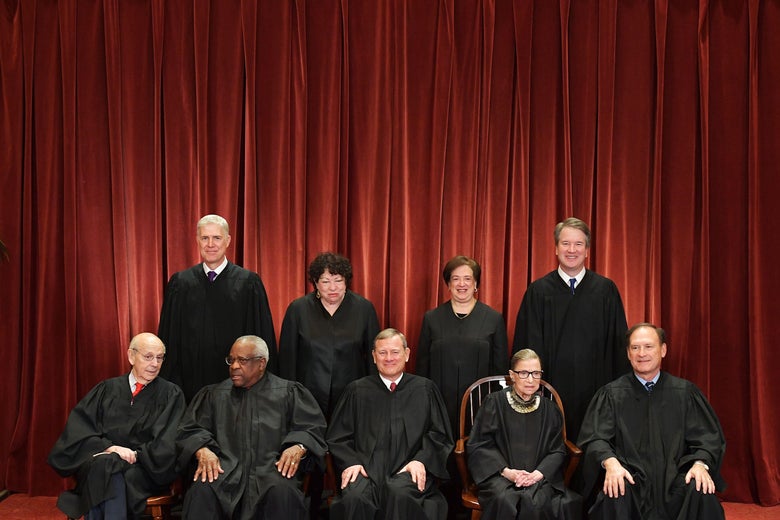
Justices of the US Supreme Court pose for their official photo at the Supreme Court in Washington, DC on November 30, 2018.
MANDEL NGAN/Getty Images
In an order issued on Monday night, the Supreme Court prevented the House of Representatives from obtaining Donald Trump’s financial records. In a unanimous decision, the justices blocked a lower court ruling compelling Trump’s former accounting firm, Mazars, to turn over the documents. Monday’s order invites Trump to ask the court to hear the case on the merits—setting up a potential showdown between Congress and the president before the Supreme Court in 2020.
Democrats on the House Oversight Committee issued a subpoena for Trump’s Mazars records in April as part of its investigation into presidential misconduct. At the time, the House was not pursuing an impeachment inquiry, but rather a host of urgent reforms. Michael Cohen had testified that the president engaged in financial malfeasance, and lawmakers sought to Trump’s records to help fashion new laws addressing ethics and conflicts of interest. The Supreme Court has long held that courts must honor a congressional subpoena issued pursuant to a “legitimate legislative purpose.” A federal district court and the U.S.
Court of Appeals for the District of Columbia Circuit ruled that the House subpoena easily met this lenient test.
But Judge Neomi Rao, a Trump nominee, dissented from the D.C. Circuit’s decision, crafting a novel theory that Congress may not investigate the president unless it does so pursuant to an impeachment inquiry. She added that the House’s decision to launch an impeachment inquiry does not matter because it cannot retroactively legitimize the subpoena. Backed by the Department of Justice, Trump appealed the D.C. Circuit’s decision to SCOTUS, urging the justices to adopt Rao’s bizarre argument and freeze the subpoena.
The Supreme Court did exactly that on Monday—with a catch. If Trump wants to keep the subpoena on ice, he must ask the court to hear the case on the merits by Dec. 5 at noon. Otherwise, the order will expire, the D.C. Circuit’s decision will take effect, and Mazars will be obligated to respond to the subpoena. Moreover, if Trump makes this request but the justices decline to take the case, the order will still expire. So Trump’s lawyers must now scramble to persuade the justices to hear this case in the coming months.
It is doubtful that the court would issue this unusual order if they planned to turn Trump away in a few weeks. More likely, the justices wanted to punt, putting off any real resolution for the time being. By doing so, however, they are only building anticipation for a fairly epic battle down the road. Presuming the justices take the case, they will hear arguments in the winter or spring, and issue a decision by June, in the midst of the presidential campaign. Chief Justice John Roberts—who is almost certainly the swing vote in this case—will soon have to decide whether to run interference for Trump or respect Congress’ oversight authority. This dispute will reveal whether Roberts is more faithful to the Constitution or the Trump administration’s deranged view of unbridled executive power. There is good reason to believe that the chief justice will side with the rule of law.
Readers like you make our work possible. Help us continue to provide the reporting, commentary and criticism you won’t find anywhere else.
Join Slate Plusfrom Slate Magazine https://ift.tt/33h1evy
via IFTTT
沒有留言:
張貼留言